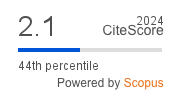Privacy-Preserving Collaborative Blind Macro-Calibration of Environmental Sensors in Participatory Sensing
DOI:
https://doi.org/10.4108/eai.15-1-2018.153564Keywords:
Participatory Sensing, Location Privacy, Sensor Calibration, Mobile Sensing, Environmental Monitoring, Calibration Rendezvous, Citizen Science, Air PollutionAbstract
The ubiquity of ever-connected smartphones has lead to new sensing paradigms that promise environmental monitoring in unprecedented temporal and spatial resolution. Everyday people may use low-cost sensors to collect environmental data. However, measurement errors increase over time, especially with low-cost air quality sensors. Therefore, regular calibration is important. On a larger scale and in participatory sensing, this needs be done in-situ. Since for this step, personal sensor data, time and location need to be exchanged, privacy implications arise. This paper presents a novel privacy-preserving multi-hop sensor calibration scheme, that combines Private Proximity Testing and an anonymizing MIX network with cross-sensor calibration based on rendezvous. Our evaluation with simulated ozone measurements and real-world taxicab mobility traces shows that our scheme provides privacy protection while maintaining competitive overall data quality in dense participatory sensing networks.
Downloads
References
Downloads
Published
Issue
Section
License
Copyright (c) 2017 EAI Endorsed Transactions on Internet of Things

This work is licensed under a Creative Commons Attribution 3.0 Unported License.
This is an open-access article distributed under the terms of the Creative Commons Attribution CC BY 4.0 license, which permits unlimited use, distribution, and reproduction in any medium so long as the original work is properly cited.




